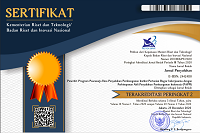Kearifan Lokal dan Hambatan Inovasi Pertanian Suku Pedalaman Arfak di Kabupaten Manokwari Papua Barat
Abstract
West Papua has the various natural resources and the human resources which have not yet been empowered optimally. Although the agriculture activities has been introduced for a long time, the subsistens agriculture has still dominated in the Arfak Tribal Group agriculture system. In their agriculture activities, the new innovation has been adopted for a short time. The new innovation on agricultural system has been considered as a disturbance of their conservative norms. But this theory disagreed by Boef et al. (1993:206) as noted that the conservative system is not the cause but the top down agriculture program which contradicted with the local wisdoms. This research is aimed to: to find the knowledge system and the local technology of Arfak people, and identify the social culture values (norms, traditional system, custom) both the supporting and the obstructing the farm of Arfak people. The results of the research showed that: (1) The Arfak tribe (people) have the indegenous knowledge to protect and to concervate the forest and to defend the food stability by the three ways, i.e (a) The three period planting, (b) multiplecrop system, (c) the natural food barn. (2) Much of the economic income has been used to fullfilled the requirements of the traditions as marrying, death, punishment of the tradition, and local fest. They are also fear to go out by the home because they believe to the supernatural power as called “Swanggi” which sent by the other village people.
Downloads
Authors who publish with this journal agree to the following terms:
- Authors retain copyright and grant the journal right of first publication with the work simultaneously licensed under a

This work is licensed under a Creative Commons Attribution 4.0 International License that allows others to share the work with an acknowledgement of the work's authorship and initial publication in this journal. - Authors are able to enter into separate, additional contractual arrangements for the non-exclusive distribution of the journal's published version of the work (e.g., post it to an institutional repository or publish it in a book), with an acknowledgement of its initial publication in this journal.
- Authors are permitted and encouraged to post their work online (e.g., in institutional repositories or on their website) prior to and during the submission process, as it can lead to productive exchanges, as well as earlier and greater citation of published work (See The Effect of Open Access).















